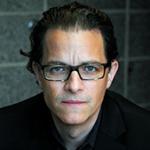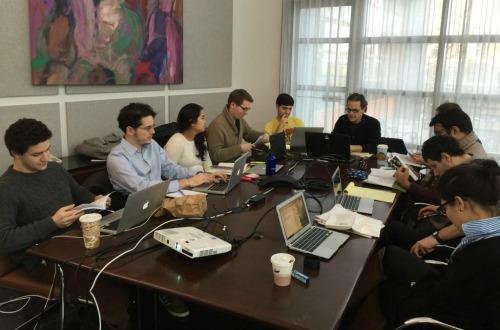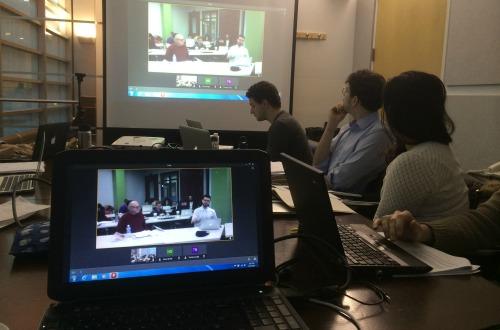Spectacle and Surveillance
A New Seminar Co-Taught by Professor Bernard Harcourt and Jointly Held at Columbia Law School and the University of Chicago Explores the Age of Big Data in Theory and in Practice
New York, March 19, 2015—As the Occupy Wall Street movement spread across the nation in 2011, Professor Bernard E. Harcourt, a leading critical theorist, became intrigued by the spectacle of the daily protests and by surveillance of the demonstrations from police and people who infiltrated the Occupy camps to spy on activities there.
His interest inspired him not only to write a book—Occupy: Three Inquiries in Disobedience (2013)—but also to develop a novel new course with one of his co-authors, University of Chicago English and Art History Professor W.J.T. Mitchell.
Inspired by his research into the Occupy Wall Street movement, Professor Bernard Harcourt created a seminar called Spectacle and Surveillance. |
Partially funded by a grant from the Mellon Centre for Disciplinary Innovation, the resulting seminar delves into the history of Spectacle and Surveillance—including the spies of Cardinal Richelieu who served as chief minister to France’s Louis XIII in the 17th century—and also modern incarnations such as the Occupy movement and the National Security Agency’s tactics as revealed by Edward Snowden. The seminar poses questions about forms of resistance to surveillance in a digital age.
The course is interdisciplinary by design. Harcourt directs the Columbia Center for Contemporary Critical Thought, which operates at the intersection of law, social sciences, and the humanities. In Spectacle and Surveillance, Columbia Law School and Ph.D. students in New York and humanities and social science Ph.D. students in Chicago join together once a week for classes that are held together via a video sharing technology. The seminar is also cross-listed with Columbia University’s Institute for Comparative Literature and Society, which promotes a global perspective in the study of literature, culture, and their social context. Harcourt serves on the executive committee of the institute, and he welcomed the opportunity to bring some of its students—Ph.D. candidates in architecture, art history, education, French and Romance philology, and musicology—into his class at the Law School.
| Students in Spectacle and Surveillance, co-taught by Columbia Law School Professor Bernard Harcourt and University of Chicago Professor W.J.T. Mitchell, take part in a discussion via video sharing technology. |
“It really gives students an opportunity to see how the other disciplines are addressing the exact same topic,” Harcourt said. “The very nature of the seminar fits perfectly within the ambition of the Columbia Center for Contemporary Critical Thought, which is to explore contemporary issues like spectacle and surveillance from different critical perspectives.”
Harcourt and Mitchell bring complementary scholarship and perspectives to bear on the course. Harcourt is an expert on surveillance and punishment theory, critical thought, and penal law and procedure, whose work has explored surveillance, disciplinary techniques, and punishment. Mitchell is a leading image theorist and historian of representation, among the founders of a new field called “Visual Studies.” He has written numerous books on iconology, media, and politics, including most recently, Cloning Terror: The War of Images, 9-11 to the Present and Seeing Through Race (Harvard, 2012).
Having those perspectives—and the views of students from all backgrounds—gives the class “a bigger picture,” Mitchell said.
“It relates spectacle and surveillance to psychology, culture, and politics in a way that the law narrowly defined might not,” he said. “It’s a very experimental kind of course both in its form and in its content. We have great students on both sides.”
Adding another level of complexity, the course examines surveillance in the age of Big Data while also participating in and taking advantage of the technology that makes Big Data possible. As they debate whether people have control over or are controlled by their social media accounts and smart phones, the students peer at each other via computer screen, their every comment and sneeze digitally recorded for posterity.
The seminar’s scope—across theory, academic disciplines, and half the United States—seems to be working.
“The class provides a great opportunity to question how and why the system of state power and financial power came to be—how power is being wielded, for what, and for whom?” said Evgueni Gokhmark ’15. “Having the class take place in the interdisciplinary space—between legal scholars and other grad students—allows for a broadening of the possibilities of thought, and for a more creative discussion about these questions.”
During the seminar, Harcourt has been completing a book on the topic of spectacle and surveillance, or what he refers to more specifically as “our expository society.” It is titled Exposed: Desire and Disobedience in the Digital Age and is due out from Harvard University Press in the fall.
He will introduce another interdisciplinary course at the Law School and ICLS in the spring of 2016 with the chair of Columbia University’s Latin American and Iberian Cultures department, Professor Jesús D. Rodríguez-Velasco, a medievalist and preeminent scholar of the Inquisition. The course is called “Tortured Confessions: From the Inquisition to Guantánamo.”


